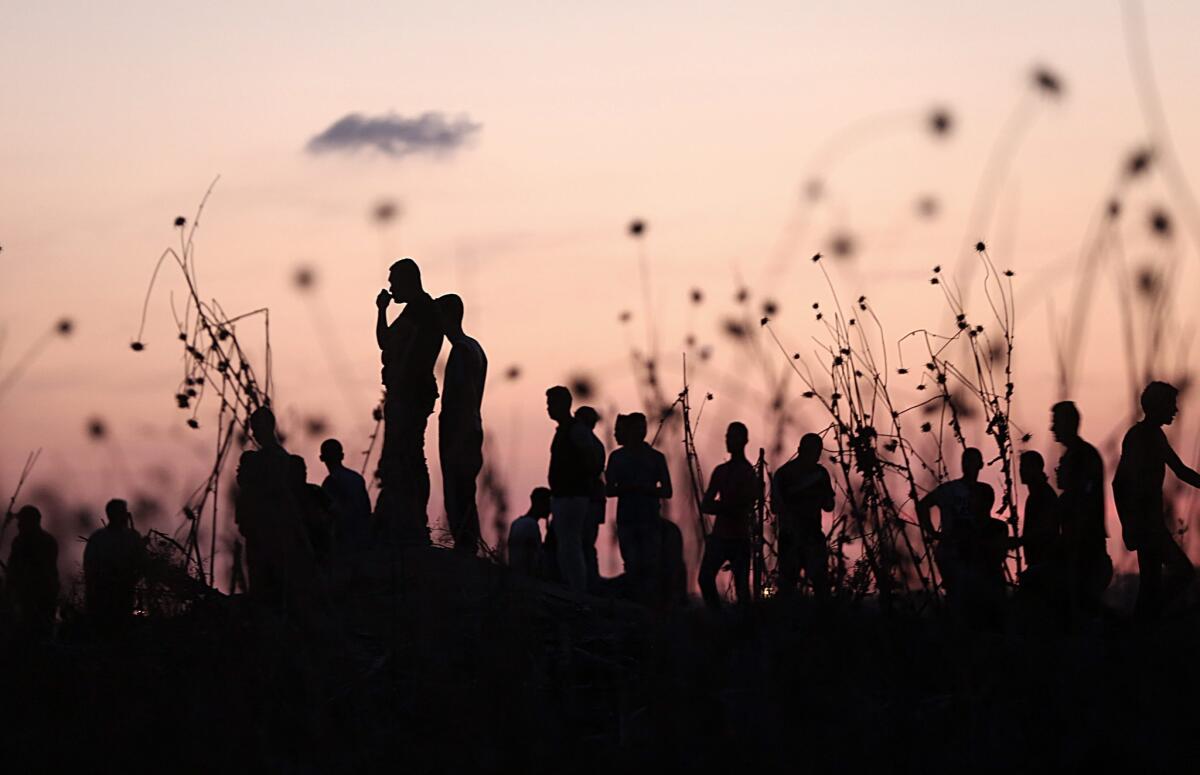Violence in Jerusalem, Gaza leaves 6 dead, including stabbing suspects

Palestinian youths clash with Israeli troops on the Nahel Oz border of Gaza City on Saturday.
- Share via
Reporting from Jerusalem — Two Palestinian teenagers were shot to death in Jerusalem on Saturday, officials said, after they carried out separate stabbing attacks on two Israeli civilians and two police officers.
------------
For the Record
Oct. 11, 10:20 a.m.: An earlier version of this article incorrectly stated that one Israeli civilian was attacked. Two were the victims of the assaults.
------------
Two more Palestinian teens were killed by Israeli forces Saturday along the border of the Gaza Strip as violence spread and appeared to escalate. According to the Israeli military, scores of Palestinians later breached the border fence in a violent demonstration.
The Palestinian death toll rose to six with the deaths of two protesters injured the day before in Gaza and the Jerusalem neighborhood of Shuafat.
As violence spread to include Gaza, concerns over rocket fire prompted Israel to deploy several Iron Dome aerial defense batteries to its southern region. There were no injuries from a rocket fired into Israel early Saturday. Late at night, multiple sirens sounded in southern Israel as a rocket was intercepted by the Iron Dome system, according to Israel military officials.
Early Sunday, Israeli jets struck two Hamas training facilities in the northern Gaza Strip in response to the rocket fire from Gaza, Palestinian sources said. Palestinian authorities later said that a pregnant woman and her 3-year-old daughter were killed when their house adjacent to one of the training centers collapsed during the airstrike.
Unrest continued to spread Saturday as thousands of Arab Israeli citizens rallied in various locations, complaining of trigger-happy security policies against Arabs. Some protesters scuffled with police, threw rocks and burned tires. At least 10 people were detained.
As tensions between Jewish and Arab Israelis rose, police planned additional security for Jerusalem and other potential flashpoints.
A statement from Israeli Prime Minister Benjamin Netanyahu announced that 13 additional companies of border police reservists would be called up for deployment “in order to restore security and order in Jerusalem and throughout the country.” The extra forces would augment three companies already called up.
The mounting death toll and violence spreading to multiple fronts has drawn international concern, including that of envoys of the so-called Mideast Quartet arriving for separate talks with Israeli and Palestinian officials next week.
On Saturday, U.S. Secretary of State John F. Kerry spoke with Netanyahu and Palestinian Authority Chairman Mahmoud Abbas.
Netanyahu made clear, his office said, that he expects the Palestinian Authority “to stop its wild and mendacious incitement, which is causing the current wave of terrorism.”
The statement also said that Kerry clarified that the U.S. is aware it is Israel’s policy to maintain the status quo.
In his conversation with Abbas, Kerry stressed the need for continuing efforts to calm the situation. According to WAFA, the Palestinian Authority’s official news agency, Abbas emphasized to Kerry that Israel must “stop allowing provocation by settlers under army protection, which could lead to a situation that cannot be contained.”
In a daily briefing Friday, State Department spokesman John Kirby said the U.S. wanted to see the “violence stop, calm returned and real progress made, which we still believe is possible, toward a two-state solution.”
Twin demonstrations in Israel on Saturday evening reflected the sharp divide among Israelis. In northern Israel, right-wing protesters burned a Palestinian flag. In Jerusalem, members of the opposite camp declared Netanyahu was responsible for the situation and called on him to resign for failing to resolve the Israeli-Palestinian conflict.
Sobelman is a special correspondent.
Special correspondents Maher Abukhater in Ramallah and Rushdi Abu Alouf in Gaza contributed to this report.
More to Read
Sign up for Essential California
The most important California stories and recommendations in your inbox every morning.
You may occasionally receive promotional content from the Los Angeles Times.













